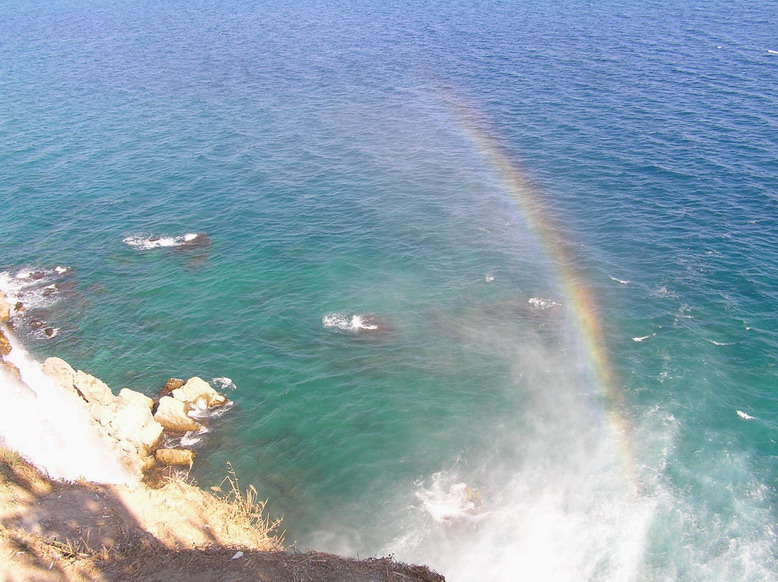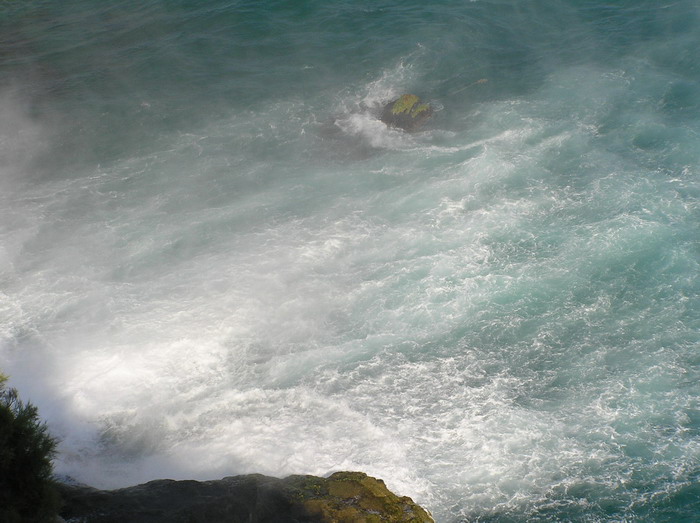There are a lot of interesting waterfalls around the world but only few of them fall straight into the sea.
Düden Waterfalls are a group of waterfalls in the province of Antalya, Turkey. The waterfall, formed by the Düden River (one of the major rivers in southern Anatolia), is located 12 km south-east of Antalya; which ends, where the limpid waters of the Lower Düden Falls drop off a rocky cliff directly into the Mediterranean Sea in a dazzling show.
Most of the domestic and foreign tourist visiting Antalya only see Düdenbasi falls without noticing how these falls come out from the deep section of the water by making a syphon (by pressure); and without knowing that these are the part of an exciting hydrogeologic and Karstic system.
At the 28th and 30th km's of the old route from Antalya-Burdur (which goes through Dösemealti town) there appear two big Karstic sources.
Kirkgözler and Pinarbasi are the sources which are very rich waterwise, coincide after a very short flow and they disappear finally in Biyikli Sinkhole. Some of the sinkholes are so big that they can swallow a huge river or a big lake. In this region there are the Sugla (Konya) big sinkhole the Biyikli sinkhole with its output of 30 m3/s. This quantity is the output of Kirkgöz and Pinarbasi springs at inundation.
The water which disappears at Biyikli Sinkhole goes 14 km underground and comes out again at Varsak pit; after a very short fall it disappears again from the other end. To understand the mechanism correctly you must follow the map and schema. The water which disappears at Varsak goes underground for 2 km and comes out again at Düdenbasi by pressure made by a syphon. The water which falls from Düdenbasi is the water coming from Kepez Hydroelectrical Complex. By all these actions (water coming in and out) Kepez Hydroelectrical Complex has been built.
By means of regulator built in front of the Biyikli Sinkhole, the waters of Kirkgözler and Pinarbasi are directed into a canal and then by a long canal to the Kepez Hydroelectric Plant to the collector from where by a pressure pipe it is carried to the balancing funnel and then dropped over the plant's turbines.

Rainbow over sea
The water from the plant's discharge unit is brought to Düdenbasi again by a long canal where it forms artificial cascades. From there the amount of water is that of a large river and this water by means of seven irrigation trenches is used to irrigate the land north-east of the city of Antalya.
After Düdenbasi the waters of Düdençay separate into a number of streams and finally east of Antalya at a height of ?0 m plunge from a platform into the Mediterranean in the form of cascades. At the spot where the cascades fall into the Mediterranean is an attractive park. In spring when water is plentiful this is a sight not to be missed. They can be seen from the sea by talking a boat trip from Antalya yacht harbour, which is a very pleasant trip.

Sea under waterfalls
Please be careful of falling down the rock!
Logging requirements
BEFORE you log this cache, you have to send your answers to the following questions by mail, thanks.
- The name of the river which makes waterfalls
a) Vltava
b) Düden
c) Amazonas
d) Nile
- The color part of the Turkish name of the sea where the waterfall ends (ask Turkish, answer translation to English - the translation is a color sea, the question is which color)
- The approximated height of the Lower Düden Falls (rounded to the nearest 10 m)
Please send your answers to mail answer1answer2answer3(at)romantic29.cz and please fill only your GC.com nickname as a subject of this mail. For example, if your answers are 1. a) Vltava, 2. Green (sea) and 3. 70 m, the correct mail is aGreen70(at)romantic29.cz. If the mail address is correct, you will automatically receive the confirmation mail and the log permission. Please do not log the cache without log permission.
Please also take a picture of yourself anywhere near Upper or Lower Düden Waterfalls and in order to log, do not forget to upload photos. Logs without relevant photo or without log permission will be deleted! Please log in English...